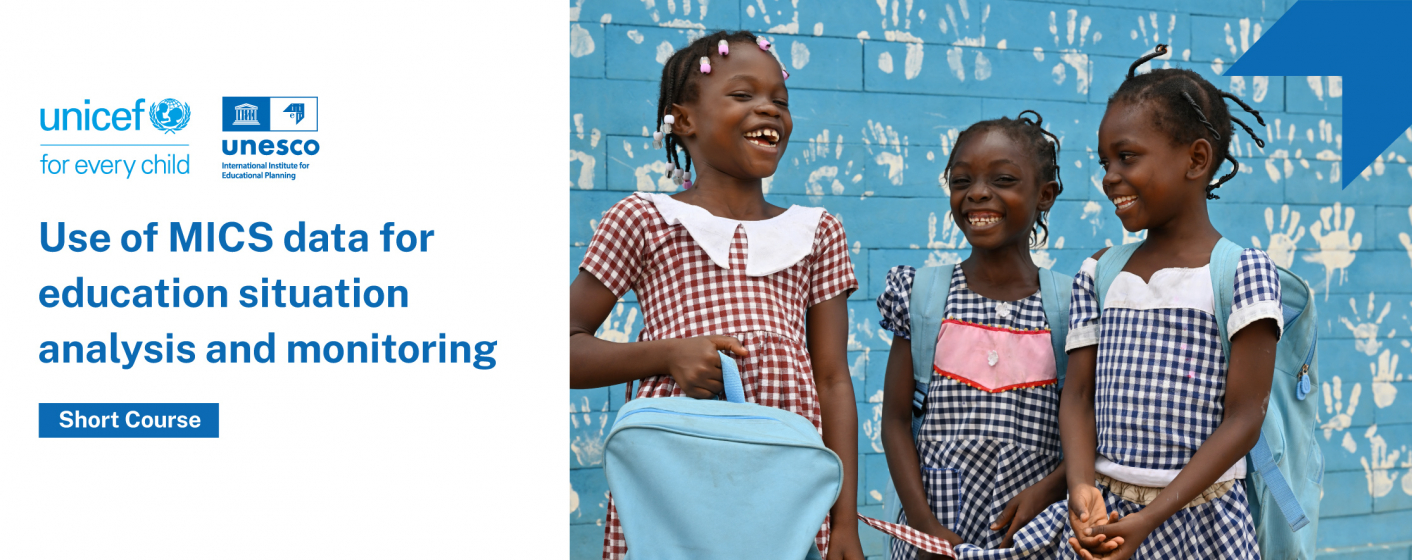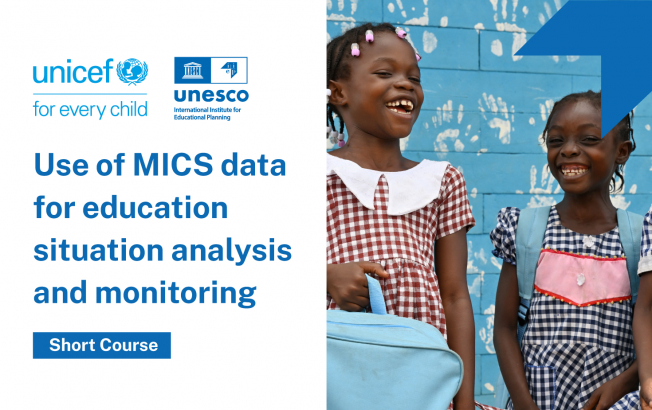Apply now: UNICEF & IIEP-UNESCO Dakar short course on use of MICS data
- Objective: Strengthen the capacity of recipient countries to use household survey data, with an emphasis on MICS data, to understand and interpret education-related indicators - particularly those relevant to the monitoring of SDG 4 - for education policy formulation, planning and monitoring.
- 5 -week training course
- 14th November - 16th December 2022 ( approx. 8 hours of training per week)
- Free of charge
- In French
- Application deadline: 21st October 2022 *** NEW DATE *** 30th October
Several countries, a number of them located in Africa, conduct education situation analysis using administrative data. While these data are extremely useful in understanding the functioning of education systems, they are limited if one wishes to expand the analysis by disaggregating the results. Moreover, countries also need to assess whether there is progress toward the SDG 4 indicators. Household data, and especially MICS data, are useful for these purposes. It is therefore essential that education analysts at the national level strengthen their capacities in data processing, analysis, and interpretation using household data, and especially MICS data, to inform policy discussions and policy making.
UNICEF & IIEP-UNESCO DAKAR FREE SHORT COURSE ON THE USE OF MICS DATA FOR EDUCATION
UNICEF and IIEP-UNESCO Dakar decided to join forces to design, develop and deliver a MICS-EAGLE (MICS-Education Analysis for Global Learning and Equity) training specifically targeted to African countries. The course curriculum will follow part of the “Manual on MICS data analysis for education indicators” and build on each institution’s experience in working in African countries.
The course will be offered in French.
At the end of the training, participants will be able to:
- Discuss the advantages and limitations of different types of education data (SIA data, school data, household data, etc.) in the calculation of education indicators, especially those relevant for monitoring of MDG 4.
- Explain what MICS data is and what it is used for.
- Explain the main education indicators, especially those relevant for monitoring of MDG
- Explain the calculation of some key education indicators, especially those relevant for monitoring MDG 4, from MICS data.
- Analyse and interpret these education indicators.
- Explain the usefulness of these indicators in informing education policy decisions and formulation.
This training is primarily intended for public officials, working at central and decentralized levels of Ministries of Education (MoE) and Ministries of TVET, and National Statistics Offices (NSO), with a priority to those based in Sub-Saharan Africa. The training will also target certain staff from local and international NGOs and Development partners, including staff from UNESCO and UNICEF country offices.
Course Structure
The course will consist of two modules, following a preparatory phase:
- Preparatory phase (7th - 11th November 2022)
- Module 1 - Introduction to basic concepts and definitions (14th - 18th November 2022)
- Module 2 - Analyzing and utilizing key education indicators using MICS data (21st November - 16th December 2022)
Selection procedure
Candidates should fill in the application form as fully and accurately as possible via this link only, by 21st october, at midnight (GMT): https://forms.gle/upm6XtwvH5Xu4ztF6
Only about 60 applications will be pre-selected. Pre-selected candidates will be required to take a test to demonstrate a minimum proficiency level in the calculation and interpretation of education indicators using Excel. From these, only 40 candidates will be selected.
Financial and practical information
The UNICEF & IIEP-UNESCO Short Course on Use of MICS data for education situation analysis and monitoring is free of charge. Any administrative, connectivity and stationery expenses must be met by participants.
Calendar
► Applications should be made using the following link only: https://forms.gle/upm6XtwvH5Xu4ztF6
Applications sent by email will not be accepted.
► Application deadline: 21st October 2022, at midnight (GMT).
► Pre-selection of (60) candidates: 31st October 2022.
►Test of proficiency in calculation and interpretation of education indicators
using Excel: 2nd November, 2022
► Confirmation of participation (40 selected candidates only): 3rd November, 2022.
► Deadline for submission of supervisor’s endorsement letter: 7th November, 2022
► Online course: 7th November - 16th December, 2022
Contacts
For any questions, please contact:
- Therrezinha FERNANDES KINKIN, Training Lead at IIEP-UNESCO Dakar (td.kinkin@iiep.unesco.org);
- Margaret KELLY, Statistics and Monitoring Specialist at UNICEF (makelly@unicef.org).


